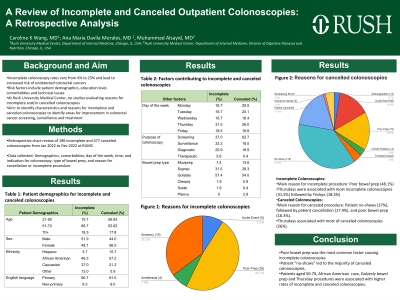Sunday Poster Session
Category: Colorectal Cancer Prevention
P0423 - A Review of Incomplete and Canceled Outpatient Colonoscopy Studies: A Single Academic Tertiary Center Retrospective Analysis
Sunday, October 27, 2024
3:30 PM - 7:00 PM ET
Location: Exhibit Hall E

Has Audio

Ana Maria Davila Morales, MD
Rush University
Chicago, IL
Presenting Author(s)
Caroline Wang, MD1, Ana Maria Davila Morales, MD2, Muhammad Alsayid, MD3
1Rush University Medical Center, Chicago, IL; 2Rush University, Chicago, IL; 3Rush University Medical Center, Countryside, IL
Introduction: Incomplete colonoscopy rates vary from 4% to 25% and are associated with increased interval risk of proximal colorectal cancers. At Rush University Medical Center (RUMC), there are no studies to date investigating areas for improvement in colorectal cancer screening, surveillance, and treatment at Rush. We sought to address these issues by identifying characteristics of and reasons for incomplete and canceled colonoscopies.
Methods: 196 incomplete and 477 canceled outpatient colonoscopy cases from January 2022 to December 2022 at RUMC were reviewed. Analysis of data included patient demographic information, prior medical and surgical history day of week and time of colonoscopy, indication for the procedure, type of bowel prep, and reasons the colonoscopy was canceled or incomplete.
Results: 67% of patients with incomplete colonoscopies were between the ages of 50-70. 46.3% were African American (AA) patients, 37% were Caucasian, 3.7% were Hispanic and 12.9% identified as “other”. Female patients comprised 48% of all incomplete cases and 42.6% had a prior abdominal or pelvic surgery. Thursdays were associated with the greatest percentage (31.5%) of incomplete colonoscopies. The most common reason cited was poor bowel prep (48.1%) and the majority of patients received Golytely (57.4%). For canceled colonoscopies, 52% of patients were between the ages of 50-70. 57.2% were AA, 21.2% were Caucasian, 15.7% were Hispanic and 5.9% identified as “other”. Female patients comprised 56% of all canceled cases and 32.1% had prior abdominal or pelvic surgery. 62.7% of canceled cases were initially scheduled for screening purposes compared to 18% for surveillance and 18.9% for diagnosis. The majority (53.2%) received Golytely bowel prep. Thursdays had the highest percentage (26%) of canceled colonoscopies and the most common reason for cancellations was patient no-shows (37%).
Discussion: Poor bowel prep was the most common factor causing incomplete colonoscopies while patient no-shows led to the majority of canceled colonoscopies. Patient ages between 50-70, AA ethnicity, Golytely bowel prep and Thursday procedures were also associated with higher rates of both incomplete and canceled colonoscopies. This study highlights the trends behind incomplete and canceled colonoscopies and will guide future initiatives aimed at preventing scheduled procedures from getting canceled or aborted.
Disclosures:
Caroline Wang, MD1, Ana Maria Davila Morales, MD2, Muhammad Alsayid, MD3. P0423 - A Review of Incomplete and Canceled Outpatient Colonoscopy Studies: A Single Academic Tertiary Center Retrospective Analysis, ACG 2024 Annual Scientific Meeting Abstracts. Philadelphia, PA: American College of Gastroenterology.
1Rush University Medical Center, Chicago, IL; 2Rush University, Chicago, IL; 3Rush University Medical Center, Countryside, IL
Introduction: Incomplete colonoscopy rates vary from 4% to 25% and are associated with increased interval risk of proximal colorectal cancers. At Rush University Medical Center (RUMC), there are no studies to date investigating areas for improvement in colorectal cancer screening, surveillance, and treatment at Rush. We sought to address these issues by identifying characteristics of and reasons for incomplete and canceled colonoscopies.
Methods: 196 incomplete and 477 canceled outpatient colonoscopy cases from January 2022 to December 2022 at RUMC were reviewed. Analysis of data included patient demographic information, prior medical and surgical history day of week and time of colonoscopy, indication for the procedure, type of bowel prep, and reasons the colonoscopy was canceled or incomplete.
Results: 67% of patients with incomplete colonoscopies were between the ages of 50-70. 46.3% were African American (AA) patients, 37% were Caucasian, 3.7% were Hispanic and 12.9% identified as “other”. Female patients comprised 48% of all incomplete cases and 42.6% had a prior abdominal or pelvic surgery. Thursdays were associated with the greatest percentage (31.5%) of incomplete colonoscopies. The most common reason cited was poor bowel prep (48.1%) and the majority of patients received Golytely (57.4%). For canceled colonoscopies, 52% of patients were between the ages of 50-70. 57.2% were AA, 21.2% were Caucasian, 15.7% were Hispanic and 5.9% identified as “other”. Female patients comprised 56% of all canceled cases and 32.1% had prior abdominal or pelvic surgery. 62.7% of canceled cases were initially scheduled for screening purposes compared to 18% for surveillance and 18.9% for diagnosis. The majority (53.2%) received Golytely bowel prep. Thursdays had the highest percentage (26%) of canceled colonoscopies and the most common reason for cancellations was patient no-shows (37%).
Discussion: Poor bowel prep was the most common factor causing incomplete colonoscopies while patient no-shows led to the majority of canceled colonoscopies. Patient ages between 50-70, AA ethnicity, Golytely bowel prep and Thursday procedures were also associated with higher rates of both incomplete and canceled colonoscopies. This study highlights the trends behind incomplete and canceled colonoscopies and will guide future initiatives aimed at preventing scheduled procedures from getting canceled or aborted.
Disclosures:
Caroline Wang indicated no relevant financial relationships.
Ana Maria Davila Morales indicated no relevant financial relationships.
Muhammad Alsayid indicated no relevant financial relationships.
Caroline Wang, MD1, Ana Maria Davila Morales, MD2, Muhammad Alsayid, MD3. P0423 - A Review of Incomplete and Canceled Outpatient Colonoscopy Studies: A Single Academic Tertiary Center Retrospective Analysis, ACG 2024 Annual Scientific Meeting Abstracts. Philadelphia, PA: American College of Gastroenterology.
